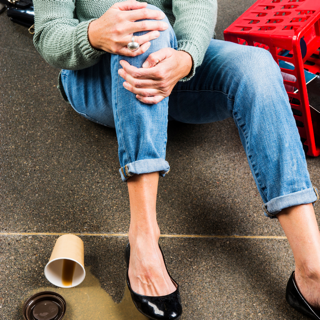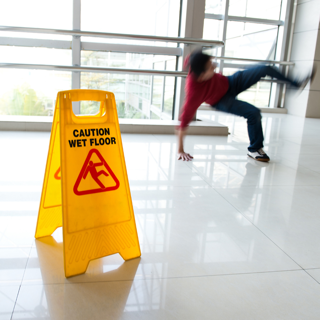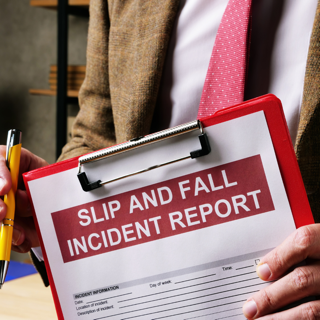Once a store or business opens its doors to the public, they are responsible for keeping the premises reasonably safe for patrons. Whether this is a “big box” chain such as a Walmart, a grocery store like Safeway, an entertainment centre such as Cineplex Odeon, or a small boutique clothing store, each business is required to take certain precautions to ensure customers are safe.
Patrons injured while on a store’s premise – either from a slip and fall incident, or another type of accident, may have a valid personal injury case against the business.

Though we often associate personal injury claims to a motor vehicle accident or slip-and-fall to icy parking lots, that isn’t always the case.
Slip and fall or tripping injuries at businesses aren’t often shared or discussed. However, you have the right to be properly compensated for your injuries, pain, and suffering if they resulted from a store being negligent. These types of claims may not always be easy to navigate, and there are important steps that a person should take if ever involved in these types of incidents to best support your case.
Types of Slip and Falls
1. Slippery or Wet Floors: Property owners are responsible for ensuring that any spills or liquids on the floors, such as a broken jar, melting snow/rain, dropped drink, etc., are promptly cleaned. Once a floor has been mopped and left to dry, a “wet floor” sign should be displayed.
In addition, certain types of flooring material, such as stone, ceramic tile, hardwood, or concrete, can become extra slippery if they get wet or over-polished. In these situations, the architects/builders may be liable for design defects, while janitorial contractors may be liable for negligent cleaning.
2. Ice and snow: When Albertans think of Slip and Fall, often icy parking lots and sidewalks come to mind. Property owners are responsible for removing snow and ice that accumulates on sidewalks, steps, stairs, parking lots, and other walkways within a reasonable amount of time after snowfall.
However, a patron may also be at fault if found responsible for contributing to the fall, like wearing inappropriate footwear for the conditions.
3. Cluttered Aisles and Fallen Merchandise: Store owners in Alberta should avoid leaving supplies, equipment, merchandise, or debris on the floors when re-stocking shelves, as this can create a tripping hazard to customers.
4. Damaged floors, sidewalks, and landscape hazards: Property owners and managers are responsible for maintaining any damaged floors (loose carpet, space rugs, floor tiles, stair treads, etc.). This can help prevent slip or trip hazards.
This includes exterior maintenance, such as damaged sidewalks or landscaping that is not yet completed. In these situations, property owners should be aware of the state of the grounds and either make repairs and/or provide visible warning signs to protect patrons.
5. Elevators, Escalators, and Stairways: Elevators and escalators should be routinely inspected and maintained at stores, hotels, and workplaces. A malfunctioning elevator/escalator that stops/starts abruptly can cause customers or staff members to be knocked down. The same is true for stairways.
You will want to ensure stairs are secure and handrails are not loose, which may contribute to a fall or injury.
6. Inadequate lighting: Dark stairwells or hallways can make obstacles or steps challenging to see. Proper lighting should be installed and maintained in all public areas.
7. Ditches and potholes: Any type of open hole, such as a trench, ditch, or other open holes, should be well-marked with warning signs and/or fencing. These should also be filled and covered in a reasonable time frame to prevent any injury.
What to do in a Store Slip and Fall Accident in Alberta
It is important to note that the customer must exercise reasonable caution to protect him or herself. If a warning sign is displayed indicating slippery floors and running, there’s a low chance that the store will be responsible for your injuries.

However, there are instances where the business is negligent in ensuring the premise is safe for patrons. If you ever trip, slip, fall or injury yourself while on the premise of a store, there are four things you should do immediately:

- Take photos of the scene – especially before someone comes to clean up or resolve the situation. This provides visual proof of the hazard.
- Contact the store owner/manager and inform of the incident, but NEVER ADMIT LIABILITY!
- Contact a personal injury or slip and fall lawyer to inquire about your claim.
- Visit a doctor to get your injuries assessed.
At McGuiness Law, we provide free consultations and can advise you about what to expect when involved in a slip and fall case. Our team has experience representing clients against “big box” chains, and we are dedicated to helping guide you through what can feel like an overwhelming process.